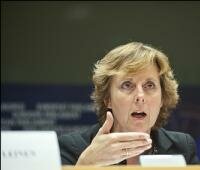A tale of two cities: Durban and Brussels
Issue:Climate change
The UN climate change negotiations in Durban began under a cloud of low expectations, which have been partly dispelled by the last-minute agreement to extend the legally-binding Kyoto Protocol on greenhouse gas emissions. And while Canada, a major emitter, has pulled out of the Protocol, a new environmental divide has emerged that contrasts with the traditional paradigm of developed versus developing countries: the new faultline pits the United States, Canada, China and India, who oppose legal limits for a variety of economic reasons, against the European Union, African, Latin American and island states who favour binding measures - often for reasons of national survival.
The following article from the Director of the International Institute for Environment and Development contrasts the dynamics that have driven both the climate talks in Durban and the debate on European financial regulation that ended with a British veto. While market forces guide the decision-making process in the world of finance, progressive decisions on the world climate have little to recommend them beyond moral appeal. While welcoming the achievements of the Durban talks, she stresses that governments are unwilling to take the steps necessary to curb carbon emissions that they are currently implementing in the name of austerity - but if we address the two problems together, then there is potential for optimism.
Camilla Toulmin | 13 December 2011
The media has been telling a tale of two crises: they are complex, interconnected and have much in common. The common threads include richer countries living beyond their means and racking up high levels of financial and ecological debt over several decades leading to an economic and financial crisis. In Europe, we are due for a substantial adjustment in living standards, to get back into balance. Analysts reckon that in the UK, families will only regain their 2002 incomes by 2016 – and that’s if all goes to plan.
On the finance side, it’s the “markets” which provide the heat that forces politicians to act. Bond buyers will only continue to purchase what the government offers if they feel confident in their commitment to public debt reduction and re-structuring of the economy to generate growth and productivity. These actions are often divisive; Prime Minister David Cameron’s decision to veto a new EU treaty has led to fears that the UK will become isolated if we don’t fully engage with Europe.
If it’s the markets that force us onto the financial straight and narrow, there seems no such force at work to push international leaders to take prompt and effective action on climate change. Unlike the fear and respect of governments for brokers and credit rating agencies, there is no baleful higher power that forces a common approach to safeguarding the planet’s future. The climate vulnerable have no power to press for change, save the moral argument.
But, despite the earlier despondency about potential outcomes from the UN Climate change negotiations, there is some room for optimism. The crucial outcome from Durban is an extension of the Kyoto Protocol. Although only the European Union and a few countries will commit to it, and the time frame for the second commitment period has yet to be decided, it’s extension re-establishes the “principle that climate change should be tackled through a framework of international law.” The agreement also:
* refers to the current emissions gap – the gap between commitments made and commitments needed to meet the 2 degrees Celcius target;
* starts a process for a post 2020 climate treaty which will require emerging economies, such as China, to commit to targets as well;
* establishes a Green Fund which could provide the financial and technical support necessary for the poorest countries to adapt to the effects of climate change, if properly financed.
The threat of bankruptcy has so focused the minds of politicians in Europe, that Greece and Italy have put in place technocratic governments to carry out the difficult and unpopular economic measures that most people recognise need to be taken, but for which no-one has the political courage to take responsibility. Would we be willing to do the same to get real cuts in greenhouse gases?
On both climate and finance, we need a credible plan for the next 10-20 years that people can buy into. This needs to be clearer about the shape of the economy we want. Crisis can be a spur to generate major structural change, as was seen in many countries like Argentina and Brazil in the 1990s. Greening the economy could provide a new narrative for growth. London could use its primacy as a global financial centre to generate the finance for new investments and green infrastructure. Many companies are cash-rich. A firm commitment to a long-term credible plan to shift to a low carbon economy could generate sustainable growth, and create much-needed jobs.
Camilla Toulmin is the Director of IIED.
Article Source: International Institute for Environment and Development
Image Source: European Parliament
 Delicious
Delicious Digg
Digg StumbleUpon
StumbleUpon Reddit
Reddit
Posted on 13/12/11

Comments
Post new comment